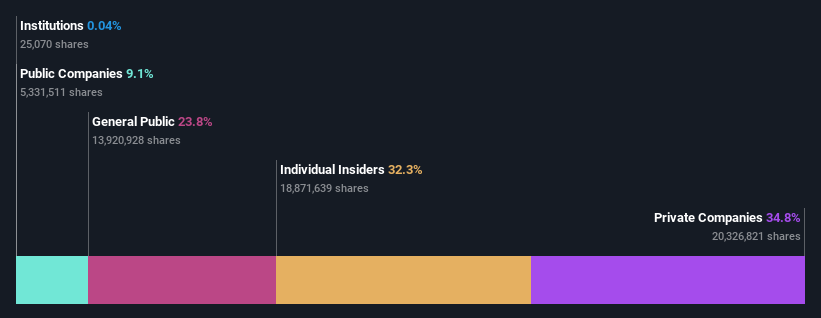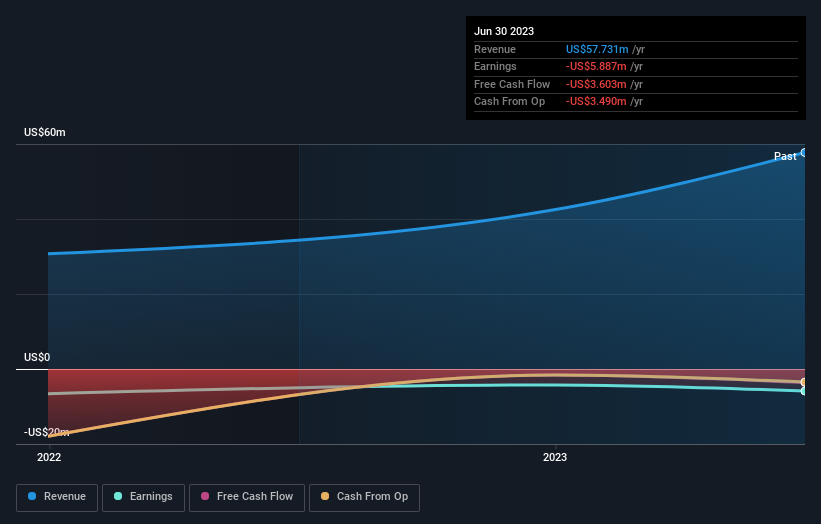- United States
- /
- Diversified Financial
- /
- NasdaqCM:FAAS
Private companies invested in DigiAsia Corp. (NASDAQ:FAAS) copped the brunt of last week's US$55m market cap decline

Key Insights
- DigiAsia's significant private companies ownership suggests that the key decisions are influenced by shareholders from the larger public
- A total of 4 investors have a majority stake in the company with 52% ownership
- 32% of DigiAsia is held by insiders
A look at the shareholders of DigiAsia Corp. (NASDAQ:FAAS) can tell us which group is most powerful. The group holding the most number of shares in the company, around 35% to be precise, is private companies. In other words, the group stands to gain the most (or lose the most) from their investment into the company.
Following a 32% decrease in the stock price last week, private companies suffered the most losses, but insiders who own 32% stock also took a hit.
Let's delve deeper into each type of owner of DigiAsia, beginning with the chart below.
See our latest analysis for DigiAsia

What Does The Lack Of Institutional Ownership Tell Us About DigiAsia?
We don't tend to see institutional investors holding stock of companies that are very risky, thinly traded, or very small. Though we do sometimes see large companies without institutions on the register, it's not particularly common.
There are multiple explanations for why institutions don't own a stock. The most common is that the company is too small relative to funds under management, so the institution does not bother to look closely at the company. On the other hand, it's always possible that professional investors are avoiding a company because they don't think it's the best place for their money. DigiAsia's earnings and revenue track record (below) may not be compelling to institutional investors -- or they simply might not have looked at the business closely.

Hedge funds don't have many shares in DigiAsia. The company's largest shareholder is Interchange Payment Group Holding Ltd., with ownership of 17%. Meanwhile, the second and third largest shareholders, hold 13% and 12%, of the shares outstanding, respectively. Two of the top three shareholders happen to be Co-Chief Executive Officer and Member of the Board of Directors, respectively. That is, insiders feature higher up in the heirarchy of the company's top shareholders.
To make our study more interesting, we found that the top 4 shareholders control more than half of the company which implies that this group has considerable sway over the company's decision-making.
While it makes sense to study institutional ownership data for a company, it also makes sense to study analyst sentiments to know which way the wind is blowing. Our information suggests that there isn't any analyst coverage of the stock, so it is probably little known.
Insider Ownership Of DigiAsia
The definition of company insiders can be subjective and does vary between jurisdictions. Our data reflects individual insiders, capturing board members at the very least. Management ultimately answers to the board. However, it is not uncommon for managers to be executive board members, especially if they are a founder or the CEO.
I generally consider insider ownership to be a good thing. However, on some occasions it makes it more difficult for other shareholders to hold the board accountable for decisions.
It seems insiders own a significant proportion of DigiAsia Corp.. Insiders have a US$53m stake in this US$165m business. It is great to see insiders so invested in the business. It might be worth checking if those insiders have been buying recently.
General Public Ownership
With a 24% ownership, the general public, mostly comprising of individual investors, have some degree of sway over DigiAsia. While this size of ownership may not be enough to sway a policy decision in their favour, they can still make a collective impact on company policies.
Private Company Ownership
Our data indicates that Private Companies hold 35%, of the company's shares. It's hard to draw any conclusions from this fact alone, so its worth looking into who owns those private companies. Sometimes insiders or other related parties have an interest in shares in a public company through a separate private company.
Public Company Ownership
We can see that public companies hold 9.1% of the DigiAsia shares on issue. We can't be certain but it is quite possible this is a strategic stake. The businesses may be similar, or work together.
Next Steps:
I find it very interesting to look at who exactly owns a company. But to truly gain insight, we need to consider other information, too. For instance, we've identified 1 warning sign for DigiAsia that you should be aware of.
Of course this may not be the best stock to buy. Therefore, you may wish to see our free collection of interesting prospects boasting favorable financials.
NB: Figures in this article are calculated using data from the last twelve months, which refer to the 12-month period ending on the last date of the month the financial statement is dated. This may not be consistent with full year annual report figures.
New: Manage All Your Stock Portfolios in One Place
We've created the ultimate portfolio companion for stock investors, and it's free.
• Connect an unlimited number of Portfolios and see your total in one currency
• Be alerted to new Warning Signs or Risks via email or mobile
• Track the Fair Value of your stocks
Have feedback on this article? Concerned about the content? Get in touch with us directly. Alternatively, email editorial-team (at) simplywallst.com.
This article by Simply Wall St is general in nature. We provide commentary based on historical data and analyst forecasts only using an unbiased methodology and our articles are not intended to be financial advice. It does not constitute a recommendation to buy or sell any stock, and does not take account of your objectives, or your financial situation. We aim to bring you long-term focused analysis driven by fundamental data. Note that our analysis may not factor in the latest price-sensitive company announcements or qualitative material. Simply Wall St has no position in any stocks mentioned.
Have feedback on this article? Concerned about the content? Get in touch with us directly. Alternatively, email editorial-team@simplywallst.com
About NasdaqCM:FAAS
Low with weak fundamentals.
Market Insights
Community Narratives




